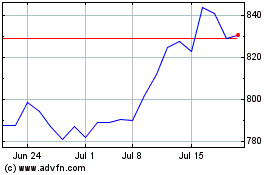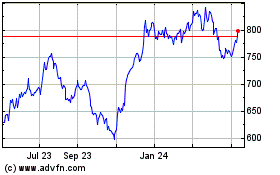By Dawn Lim and Laura Cooper
Private-equity firms have long hewed to a certain model: They
raise investor money to buy businesses, then exit their bets in a
decade or so.
Now, some private-equity firms want to stay invested in
companies longer, perhaps even forever, driving a broad push by the
industry into longer-life pools, and what some call
permanent-capital funds.
BlackRock Inc., for instance, is seeking more than $10 billion
for a new private-equity pool that has no deadline for exiting the
investments it makes. Other companies, including Altas Partners,
Blackstone Group, CVC Capital Partners, KKR & Co. and Vista
Equity Partners, collectively have raised or are still looking to
raise billions of dollars for pools designed to last longer than
the typical 10- to 12-year funds.
KKR has amassed $9.5 billion to hold companies for the long
term, and well beyond the life of traditional private-equity funds.
KKR is currently investing $8.5 billion of that capital, which is
the largest pool of its kind and is backed by $3 billion of the
private-equity firm's own balance sheet. The firm raised the
remainder from institutions, with a large amount coming from
sovereign-wealth funds and insurance companies.
Fewer flubs
There are clear incentives to a long-term strategy for both the
firms and the investors. For one, firms that keep investments
private for longer can lower the risk of flubbed initial public
offerings. There is also appetite among some large investors --
sovereign-wealth funds in particular -- for more investment
strategies that match their own long-term strategic horizons, which
often extend for decades or longer.
To keep these long-term investors satisfied, firms managing
permanent-capital funds typically purchase businesses with
recurring revenue -- examples could include a dental-services chain
with regular customers or a software company with licensing
agreements -- that can flow back to the funds' investors as fee
income for decades.
'Holy Grail'
One technology banker has called permanent-capital funds the
"Holy Grail for private-equity firms" because they help the firms
compete with corporate buyers, which can essentially hold the
companies that they purchase indefinitely. Private-equity funds, in
contrast, face pressure to sell companies or take them public after
a few years.
The trend to long-term private-equity investments could have
repercussions in broader capital markets. A proliferation of
long-life funds could further shrink the U.S. public market as more
companies can readily tap the private markets for money and delay
plans for initial public offerings. About 200 companies went public
in the U.S. last year, down from more than 800 in 1996, according
to research firm Dealogic.
Another incentive of long-term deals for private-equity firms is
they may help the firms avoid the distraction of having to market
new funds every three or four years.
But the rise of funds built for the very long run also raises
the risk that private-equity managers become less motivated to
generate the outsize returns that have characterized the asset
class over the past decade or more. Indeed, it could become
challenging for firms to incentivize their deal makers to stick
around when the investments they make are expected to last for
decades.
Too much 'flipping'
The shift away from traditional 10-year funds shows large
institutions are rethinking their relationships with Wall
Street.
"Investors with a long-term horizon don't see the point of
investing in private-equity funds to hold companies for just four
or five years," says Ludovic Phalippou, an associate professor of
finance at the University of Oxford's Saïd Business School.
These investors want to avoid having their managers become
forced sellers of companies. Instead, they are warming up to a view
that institutions should back companies as long as possible to
maximize their profits.
Some big investors say they are tired of finding themselves
indirectly on both sides of a deal as private-equity firms
increasingly trade companies among themselves. The volume of such
deals globally rose to $93.7 billion in 2017, the highest level
since 2007, according to Dealogic.
"We've seen our own investments flip four times through our
portfolio from one manager to the next manager to the next
manager," Jerry Albright, the investment chief of the Teacher
Retirement System of Texas, said at a pension meeting earlier this
year. "In between those flips, there's fees."
California Public Employees' Retirement System, for its part, is
exploring plans to set up multibillion-dollar funds to buy and hold
private companies for extended periods. The idea would be to hold
companies "forever rather than being forced to sell them at an
arbitrary time point," Chief Investment Officer Ted Eliopoulos told
The Wall Street Journal in May.
Staying put
As it gets harder for investors to find bargains when assets are
increasingly overpriced, staying put in companies may be more
attractive than having to put cash to work.
For investors, one of the biggest draws of a private-equity fund
with an exceptionally long outlook is the lack of more attractive
investment options in a low-yield environment.
Institutions that have backed this strategy "prefer to keep
their capital invested for longer, rather than having it returned
quickly only to have to go out again to find opportunities to put
it to work," says Webster Chua, KKR's head of corporate
development.
Ms. Cooper and Ms. Lim are Wall Street Journal reporters in New
York. Email them at laura.cooper@wsj.com and dawn.lim@wsj.com.
(END) Dow Jones Newswires
June 19, 2018 22:14 ET (02:14 GMT)
Copyright (c) 2018 Dow Jones & Company, Inc.
BlackRock (NYSE:BLK)
Historical Stock Chart
From Mar 2024 to Apr 2024

BlackRock (NYSE:BLK)
Historical Stock Chart
From Apr 2023 to Apr 2024
